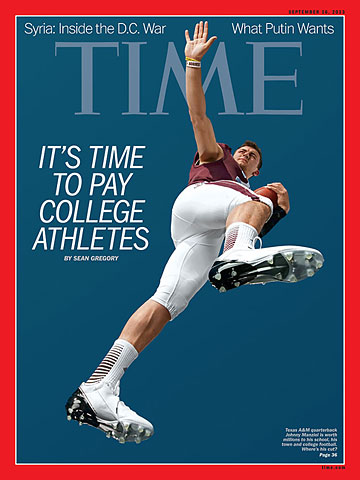
(5 of 7)
The time is right to give schools the option to share their rising sports income with college athletes. Not every school would--or could--participate. Only the 60 or so schools in the power conferences, which have the football and basketball revenues to support such payments, would likely even consider such an option. With conferences and schools set to see record television payouts for the next decade and beyond, the idea of paying players is no longer just fodder for academic debate. It's an ethical imperative.
Schools could either pay players whatever schools want in a free market, or salaries could be subject to regulation. In reality, universities probably aren't going to go from $0 in compensation, where they are now, to allowing an unlimited amount. Salary caps exist in the NBA and NFL; they're fair game for college sports too.
Here's how things might work. All athletes would be eligible for payments in addition to any scholarship. But most schools would pay only football and men's basketball players, since those sports produce the bulk of the revenues. A Southeastern Conference (SEC) school like Alabama could pay 50 of its players up to a limit of $30,000 a year. The best players would get near the maximum while others would get less; it would be up to each school to distribute the funds as needed. And schools could pay athletes in other sports, of course. A star baseball player, or a women's basketball player at a powerhouse like Connecticut, could also get a paycheck. But the total amount any school could pay out would be capped at $1.5 million. Experts think this is a conservative number given the millions in revenue that sports and TV deals provide. Any cap won't placate the free-market supporters; $30,000 per year, however, is a huge improvement over nothing.
Plus, athletes can make money in other ways. Universities should also give athletes at least the right to secure sponsorships, star in a commercial or, yes, offer their signatures for money. The schools could demand their cut too. "Lifting the restriction on athlete commercial opportunities is a great step toward compensating them for the value they generate," says Warren Zola, assistant dean of the Carroll School of Management at Boston College and an expert in college-sports business and law. "And it doesn't cost the schools anything." Since schools would cap athletes' salaries, it would be only fair that they not cap sponsorships. Players can give schools the right to reject sponsorships on moral grounds. No beer deals. Also, schools could require that players remain academically eligible in order to receive any kind of payments. Schools would in effect be adopting the Olympic model. If a gold-medalist like Apolo Ohno wins mainstream appeal, he's free to cash in on his name.
Sponsorships could especially benefit female college stars, who don't have access to the same professional opportunities that men do. Sponsorships for star players shouldn't upset team dynamics on campus. Deals among Olympic athletes are uneven, but such economic disparities don't seem to hamper Team USA's success.
